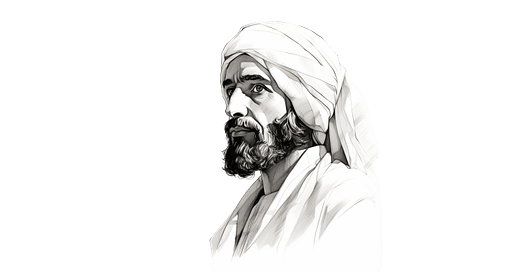A Journey Through Time: The Enduring Legacy of Al-Zahrawi and the Quest for Life's Work
While listening to David Senra and Patrick O'Shaughnessy's podcasts, I am struck by a recurring term: 'life's work.' This concept, a frequent topic in their dialogues, led me to explore historical figures who embodied this ideal. Among them, Abul Qasim Khalaf ibn al-Abbas Al-Zahrawi, known in the West as Albucasis, stands out. Living in the 10th century in Cordoba, within the Umayyad Caliphate in Spain, his dedication to medicine offers a compelling illustration of what it means to commit to a life-defining work.
In reflecting on Al-Zahrawi's story, I found connections with the themes discussed by Senra and O'Shaughnessy, offering insights into the challenges and rewards of pursuing a singular, significant goal in one's life.
As a young man, Al-Zahrawi's curiosity was piqued by the medical practices of the time, but he quickly realized that much of what was considered medical knowledge was based on superstition or untested theories. He witnessed the sufferings of people due to ineffective treatments, and this observation kindled in him a deep desire to seek out and establish a more empirical, experiential approach to medicine.
Dedicating his life to this cause, Al-Zahrawi spent endless hours in study and practice. His days and nights were consumed with learning, experimenting, and documenting his findings. He faced skepticism from those who clung to traditional methods, and at times, his endeavors seemed like a solitary battle against the entrenched beliefs of the era.
Yet, Al-Zahrawi persevered. Over the years, his efforts culminated in the creation of "Kitab al-Tasrif" (The Method of Medicine), a comprehensive 30-volume encyclopedia of medical knowledge. This work was not just a collection of his own findings but also a compilation of the entire medical knowledge available at the time, refined and tested through his empirical approach.
Al-Zahrawi's dedication to accuracy and detail was extraordinary. He introduced innovative surgical techniques and tools, many of which laid the foundation for modern surgery. His approach was revolutionary, combining hands-on experience with a rigorous method of documenting procedures and results.
His greatest challenge, however, was not just in the creation of this monumental work but in ensuring its acceptance and use. Al-Zahrawi spent the latter half of his life teaching and advocating for his methods, facing resistance yet never faltering in his belief that what he had created was of immense value to humanity.
Today, Al-Zahrawi is remembered as a pioneer, a man whose commitment to his life's work transcended the constraints of his time, creating a legacy that would benefit countless generations. His story is a powerful testament to the enduring impact of one's life's work, rooted in a deep sense of purpose and an unwavering commitment to making a difference.
The work we put into achieving something meaningful, though demanding, has the power to create lasting value, outliving us and touching future generations. Conversely, when we chase quick pleasures or success, cutting corners for immediate gratification, the glory is fleeting, and often, what remains is the sting of our poor choices.
Drawing inspiration from Al-Zahrawi's example, we can identify several steps to shape our own lasting legacies.
Choose Longevity over Expediency: When making decisions, consider the long-term impact over immediate benefits.
Embrace the Process: Understand that meaningful achievements are often the result of sustained effort and patience.
Uphold Integrity: Let your actions be guided by a sense of right, even when shortcuts seem tempting.
Reflect on Your Legacy: Think about how you want to be remembered and let this guide your choices and actions.
Learn from Both Success and Failure: Take lessons from every outcome, using them to build a foundation for future decisions.
As you ponder these ideas, ask yourself: Are the choices you're making today building something that will stand the test of time, or are they merely temporary structures, destined to fade away? Remember, the true value of our actions often reveals itself far beyond the present moment.
Book Reference
Lost Islamic History: Reclaiming Muslim Civilization from the Past by Firas Alkhateeb




